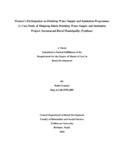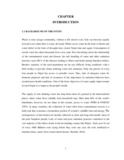Please use this identifier to cite or link to this item:
https://elibrary.tucl.edu.np/handle/123456789/2249| Title: | Women's Participation on Drinking Water Supply and Sanitation Programme (A Case Study of Dinglang Khola Drinking Water Supply and Sanitation Project, Sarumarani Rural Municipality, Pyuthan) |
| Authors: | Gautam, Rabin |
| Keywords: | Womens;Drinking |
| Issue Date: | 2018 |
| Publisher: | Central Department of Rural Development |
| Abstract: | Women's Participation on Drinking Water Supply and Sanitation Programme (A Case Study of Dinglang Khola Drinking Water Supply and Sanitation Project, Sarumarani Rural Municipality, Pyuthan) is representative vision of the reality. Main thrust of the present study is to identify the role of women position, decision making, composition in WUSC and sanitation programme, to analyze the impact of water supply and sanitation programme of women's life and to explore the contribution of women in the study area in WASH programme. Exploratory as well as descriptive research design was used. Both the primary as well as secondary data was collected and used in this study. Primary data was collected in the field, through interview and observations. Women are the main stakeholders of water related activities and they spend more time than males do. For this purpose the researcher was mainly base to focus on about women's participation and their role. For the purpose of this study, women water users (respondents) were selected from the project area and every household was requested to provide a responsible adult woman. Besides, women motivators, village maintenance worker, village health promoter and women volunteers have all been included for the study. There are 147 households in this area. Among them 60 % household, which represents 90 household's women were taken as sample by the random sampling method. Those women who are more involved with water related activities such as water carrying and washing clothes was interviewed. As women are the targets for this study, the sample units were women themselves. Mainly, structured and semi-structured questionnaires were used for the collection of data for selected households. Lacking access to knowledge of sanitation behaviour, awareness of the health implication of improperly handled water and poor sanitary habits have increased among most women and men. Due to familiarity with facial oral transmission of disease, more people are building and using latrines and pursuing others to do the same. A growing number of people now feel that villagers should have latrines, and should be aware of the pointlessness of their own efforts to use latrines if others continue defecating in the open. The positive result of the new water supply system in the area with community participation and women involvement has created a realization that the sustainability of the project largely depends on people's participation with women's involvement. The training provided by the Rural Water Supply and Sanitation Project Western Nepal Phase II has made the women realize their self-respect and confidence. Before the project there were no such attempts which voiced women's need regarding water management and in other fields. A user's committee consists of only female and other 10 male members. They play important role to raise fund for maintenance work. It is understood that women have been playing an important part in the formulation, maintenance and operation of the policies. The women have also participated voluntarily in transportation of local materials. Thus this reflects gender involvement in community participation. According to the implementing agency, the engineers and overseers have actively tried to change women's reality of self- esteem by adopting innovation approach and focus group discussion to make realize that women have an important contribution to make. According to the local women water users, the community and their children seem much healthier. Especially, diarrhea, skin disease, worms and infection of eyes among infants have been tremendously reduced. There is a great change in group-formation. A large number of women actively take part in the village meetings. When the district engineer visits the village for supervision of the water supply system, the women actively put forward their ideas and suggestions as well as their problems. Women motivators play a key role in building awareness and motivating people, and give the ideas about sanitary habits, and building of VIP latrine. Likewise, they make the work of the engineers easy by assisting project officials in conducting survey on knowledge, awareness and evaluation structures, and by organizing the orientation camps in the health and sanitation and education fields. The training provided by the implementing agency to the village maintenance workers in matter of water system, of the particular village, has created a positive impact in the community self-help project. This has led to the villagers realize the importance of their own village. Some trainings and exposure visits provided by the agency enhance the women's confidence and management capacity. However, further training and exposure visits are most essential for women's capacity building and management of DWSSP. |
| URI: | http://elibrary.tucl.edu.np/handle/123456789/2249 |
| Appears in Collections: | Rural Development |
Files in This Item:
| File | Description | Size | Format | |
|---|---|---|---|---|
| Cover Page-2.pdf | 278.95 kB | Adobe PDF |  View/Open | |
| CHAPTER-2.pdf | 1.15 MB | Adobe PDF |  View/Open |
Items in DSpace are protected by copyright, with all rights reserved, unless otherwise indicated.
